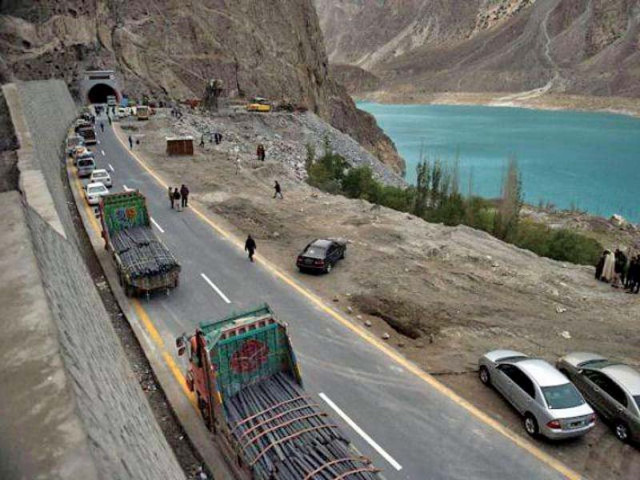CPEC’s strategic ML-1 project gets final nod
Ecnec approval paves way for loan negotiations with China

The Executive Committee of the National Economic Council (Ecnec) on Wednesday approved the strategically important Mainline-1 railway project of the China Pakistan Economic Corridor (CPEC) worth $6.8 billion, paving way for loan negotiations with Beijing, which would finance 90% of the cost.
The government has found a middle ground to commence work on the project so that the concerns of the International Monetary Fund (IMF) about debt sustainability could be addressed.
In the first phase, Pakistan will undertake only $2.4 billion worth of construction work due to “Pakistan’s commitments to the IMF programme”, according to official documents.
The country has designed the “package-1” of ML-1 keeping in mind the IMF ceiling that restricts its spending on the project during its programme period at $2.5 billion.
The ceiling will not affect the pace of construction as work on “package-2” of the project – costing worth $2.7 billion -- will start a year after work on “package one” has kicked off.
Work on “package-3” costing $1.7 billion will start two years after the first package, according to the summary of Ecnec.
The Ecnec meeting continued for less than half an hour in which it approved four projects worth Rs1.234 trillion.
The ML-1 was also approved at a rationalised cost of $6.806 billion on cost-sharing basis between the governments of China and Pakistan, according to a finance ministry handout.
Finance Adviser Dr Abdul Hafeez Shaikh, who is the Ecnec chairman, formed a committee to review the proposal of shifting $856 million Lalamusa-Rawalpindi section from package-3 to package-1 on the request of Railways Minister Sheikh Rashid.
However, Planning and Development Minister Asad Umar opposed the idea of introducing any changes in the three construction packages as they were finalised in consultation with all stakeholders including the railways secretary.
It has also been decided that around $6.2 billion Chinese loan will be taken both on the books of federal government and Pakistan Railways due to the weak financial conditions of the state-owned enterprise. Pakistan Railways is not in a position to pay salaries and pensions to its employees without cash injection from the federal government.
According to the ML-1 Framework Agreement, the project will be executed in engineering, procurement and construction mode by the Chinese contractors. Separately, a summary will also be moved for the approval of the Economic Coordination Committee of the Cabinet to seek exemption from the international competitive bidding.
Under the CPEC Framework, ML-1 is the only strategic project being finalised as part of the initial $46 billion deals.
The local component of the ML-1 project has been estimated at Rs672.8 billion or slightly over $4 billion. The foreign exchange component is estimated at $2.71 billion.
The railways ministry will prioritise the Karachi-Lahore segment, given its financial and economic benefits. The project cost has been firmed up on the basis of preliminary design and its third party review.
The planning ministry has advised that the parent companies of the consultants, who carried out the feasibility study, preliminary design and third party review, must not take part in the bidding process to avoid conflict of interest, according to the official documents.
The Chinese loan will be in programmatic mode and only amount required for the particular phase would be contracted so that unnecessary commitment charges are avoided.
Pakistan now expects a fair bid price, close to engineer’s estimates, as third party has vetted these cost estimates.
The ML-1 project includes the dualisation and upgrading of the 1,872-km railway track from Peshawar to Karachi and is a major milestone for the second phase of CPEC.
The Pakistan Railways had proposed the construction of the project at a cost of $9.2 billion but the planning ministry has cut it to $6.8 billion, which is 25.7% less than the original estimates.
The package-1 of the -I will be completed between January 2021 to December 2024 and will cover the construction of the 527-km long track between Peshawar, Rawalpindi and Lahore.
Package-2 will be completed from January 2022 to December 2026 and will upgrade the 521-km long track from Lahore to Hyderabad. Package-3 will upgrade the 740-km Rawalpindi-Peshawar and Hyderabad-Multan track.
The government has reduced the project cost by one fourth or $2.4 billion without bringing major change in the scope of the project.
The planning ministry excluded the ancillary cost like project management fee of 1% of total construction cost, insurance cost of half percent of total cost, the 0.6% cost of detailed design and construction drawings, security measures cost of 0.75% and contingencies equivalent to 4% or $367 million have been excluded from the scope of the project.
Similarly, $477.5 million worth of price escalation has also been excluded from the project scope, as the contract will be awarded in the engineering, procurement and construction mode.
Rolling stocks worth $398 million have also been excluded from the project scope, which helped bringing the cost down to $6.8 billion.
Under the project, the existing 2,655-km long track will be upgraded. The speed of passenger trains will increase from 65 to 110 km/hour to 165 km/hour and the line capacity will increase from 34 to 137/171 trains each way per day.
The railways ministry will form a project steering committee for effective supervision and implementation of the project.
Ecnec also approved the Pakistan Single Window project at a total cost of Rs11.1 billion. The project will be completed by June 2023 and it is expected to enhance Pakistan’s global ranking in cross border trade related indicators.
The forum also gave the nod to the change in the cost-sharing ratios of the Asian Development Bank and its co-financing partners for the construction of the BRT Red Line Project, Karachi at a cost of Rs78.4 billion. The project was already approved by Ecnec on August 29 last year.
A PhD scholarship programme under US-Pakistan Knowledge Corridor (phase-1) was also approved at a revised cost of Rs25.2 billion. In the revised PC-1, the scope of the project has been curtailed to 1,000 scholarships (from 1,500 scholarships) mainly due to appreciation of dollar rate against the Pakistani rupee and the inclusion of tuition fee/ research grant.
The Central Development Working Party had cleared the ML-1 project in June this year and recommended it to the Ecnec for approval.


















COMMENTS
Comments are moderated and generally will be posted if they are on-topic and not abusive.
For more information, please see our Comments FAQ